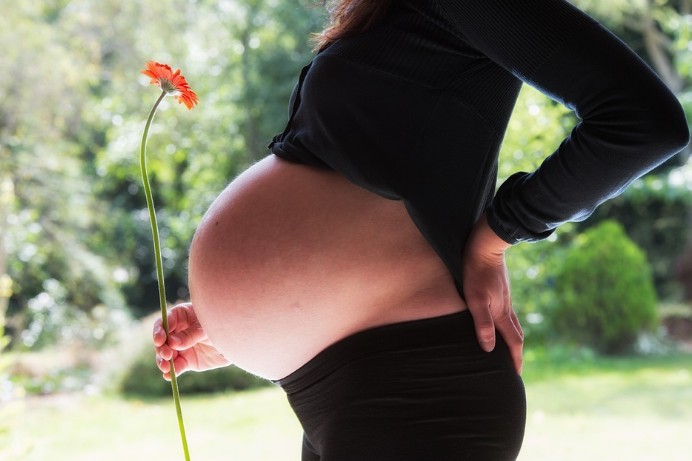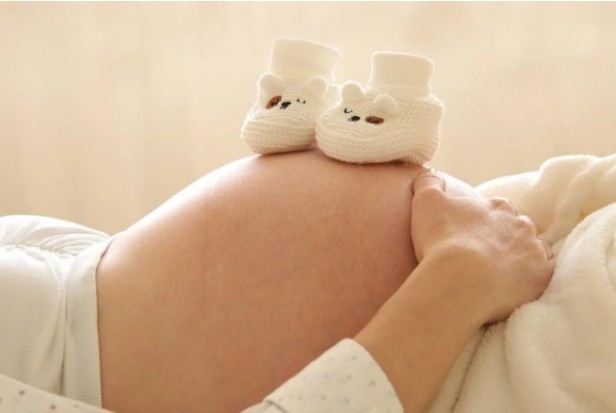This significant pregnancy milestone—feeling your baby’s first fluttering movements during the second trimester—has been something you’ve been anticipating for weeks. Later, as you enter your third trimester, you might experience even greater pressure. Still, all throughout your pregnancy, you might wonder, “Why is my lower abdomen being rubbed by my baby?” You shouldn’t be alarmed if you feel the baby move in your lower abdomen because there are many logical explanations for this, so you can relax.
What Is Baby Movement During Pregnancy?
One might assume that the fetus’s full-term stage is when a baby kicks the most frequently during pregnancy. Fetal movement, however, actually starts as early as 16 weeks into a woman’s pregnancy and lasts the duration of her pregnancy.
As a result of their typically low intensity, brief duration, and irregular frequency, an unborn child’s kicks can be initially difficult to feel. An unborn child’s movements can be felt all over a woman’s abdomen by the third trimester, when the baby is very active in utero and may even intensify with each passing day.
Babies frequently cause lower abdominal pain that feels like a punch or gnawing sensation. It’s crucial for pregnant women who experience this symptom to discuss its causes with their healthcare provider because the pain can be so intense that it interferes with sleep and makes going about daily tasks difficult.
The baby’s position in the womb typically causes low-pitched kicking in expectant mothers. For instance, a breech-positioned fetus may be at the mother’s pubic bone, making the kicks feel like they are coming from lower down on her abdomen rather than from close to her naval area.
Other times, it might be a sign of a more serious health problem. For instance, a baby kicking low during pregnancy may indicate that the mother’s placenta is in a posterior position or that her uterus is enlarging as a result of preeclampsia. If that’s the case, it might need immediate medical care and treatment if it goes untreated.
What Does It Signify When A Baby Kicks Low?
You’ll be tuned in for everyone once those infant movements begin in earnest. Early on, between 12 and 14 weeks, or a little later, you might start to notice quickening.
At 18 weeks or more, you’ll notice more noticeable bumps or kicks.
You may feel kicks low down, close to your pubic bone, once you are past the 18-week mark and experiencing regular kicks.
Your uterus has only risen as high as your belly button by the time you are 20 weeks pregnant, which is one explanation for this. You probably won’t experience a kick above your belly button.
You’re much more likely to feel the baby move or kick way down close to your cervix.
It’s important to keep in mind that an anterior placenta can make it harder to feel kicks. Your womb’s anterior wall is home to an anterior placenta. Any movements your baby might make are generally muffled by this.
Your doctor ought to be able to inform you of the location of your placenta if you’ve had any prenatal ultrasounds.
Do you know which way your baby is facing?
The location of the kicks may give you a hint as to where your baby is hanging out as he grows.
Some positions babies can be in are:
- Transverse (sideways), with the head on the left side
- Transverse, with the head on the right side
- Breech (bottom down)
- Vertex (head down).
It’s likely that your baby is head down if you feel kicks under your ribs. Transverse is indicated by kicks to one side or the other. A baby in the breech position may cause lower-body kicks.
Midway through your pregnancy, fetal position is not a concern. As your pregnancy develops, it is unquestionably something to think about.
You can actively encourage optimal fetal positioning, which has the potential to ease labor and delivery.
Does It Hurt When The Baby Kicks You In The Lower Abdomen?
Additionally, if you wonder, “Do baby kicks hurt?” then you might be surprised that the answer is usually “no.” While a baby generally doesn’t cause sharp pain when kicking or punching, you will be able to tell the difference between your baby’s movement and flatulence brought on by pregnancy. For example, during the sixth month, a baby’s kick takes on a “punchy” type of movement. You can also detect the rhythmic tremors if the person has hiccups. However, because there is still a lot of room in the amniotic sac, you won’t feel your baby move in the lower abdomen unless he or she is engaged in some rather elaborate acrobatics.
Likewise, if you experience pressure, more like a “thud” in your lower abdomen, your baby’s head, rather than the feet, is likely pressing against your belly or your back.

Low Kicks—do They Signify A Breech Baby?
Babies continue to move a lot during the middle of pregnancy.
By touching those precious baby feet, you can have fun speculating about their location.
Baby may decide to hang out on your belly’s left or right side. Some infants enjoy shifting positions throughout the day.
Your baby may be entirely breech if you can feel his or her feet on your cervix or bladder. With the head up and the legs and bottom down, this is the position.
It doesn’t necessarily follow that this is the last position in which your baby will give birth. From about 30 weeks on, a baby typically opts for a head-down position.
What To Do If Your Baby Is Only Kicking Lightly?
A health problem may be present if the baby kicks extremely low during pregnancy. Most frequently, this denotes a breech or transverse position for your baby rather than a head-down position. If left untreated, seek immediate medical attention and treatment. For instance, a posterior placenta may require surgery to correct, whereas preeclampsia may be treated with medication.
When the baby is in a breech or transverse position rather than head-down, the baby’s kicks may occasionally come from a different area of your abdomen. Seek immediate medical attention and treatment if necessary. For instance, a posterior placenta may need to be corrected through surgery, whereas preeclampsia may be managed with medication.
Consult a doctor to determine the best course of action and how to relieve this symptom if you believe your baby is kicking low due to an overactive pelvic floor, uterine fibroids, or endometriosis. In other instances, it might be a sign of a more serious condition, like uterine fibroids.
As your child develops, its kicks might not feel as low, but if you experience any of the symptoms listed above, it’s crucial to see a doctor right away for prompt medical attention and treatment.
Baby Kicking Very Low At 27 Weeks
It won’t likely be head down until at least 30 weeks of pregnancy. Therefore, feeling the baby kick very low at 27 weeks is still common.
Your infant may simply prefer to be in a certain position. Some infants choose a particular spot and remain there all day long, while others change positions.
You’ll learn more about your child’s unique movement pattern.
Being in touch with a group of pregnant women online may be beneficial. Your sense of community can be boosted by having a support system, which also provides a forum for you to express any emotions, worries, or inquiries.
According to research, a sense of community helps mothers and their babies’ health outcomes.
Obviously, if you have any concerns at all, contact your healthcare professionals right away. They can also respond to your inquiries and assist you in figuring out what is typical during pregnancy.
Is It Normal To Feel The Baby Move Low?
Yes, it is typical for a baby to move very low when a mother is pregnant. The majority of the time, this is due to the baby’s position in the womb being different from what was initially thought (for example, being breech or transverse instead of head-down). Although each woman will experience these sensations differently and at different times, they typically subside after delivery with no negative effects on the mother’s health in the long run.
Because of the mother’s overactive pelvic floor, uterine fibroids, or endometriosis, kicks may also feel weak during pregnancy. If you are experiencing this symptom, consult your doctor right away because it could be a sign of something more serious that requires immediate medical care and treatment.
Due to their position in the womb, such as when they are breech instead of head-down, the baby’s kicks may occasionally simply come from a different area of your abdomen.
Final Thoughts
When you wonder, “What is causing the lower abdominal kicking of my infant?” you can rest assured that there are no major issues affecting your pregnancy, and for the most part, the location of your baby’s movement relates more to his or her position. But of course, if you ever have questions or concerns, you should always contact your practitioner. Other contributing factors include the size of your baby and the stage of your pregnancy. In the interim, just take pleasure in watching your child perform flips and anticipate the happy delivery day.



